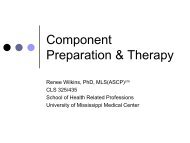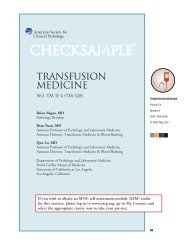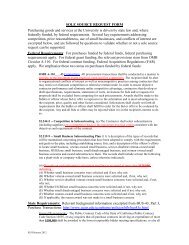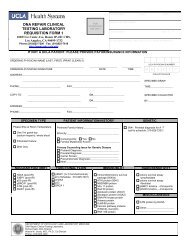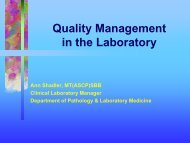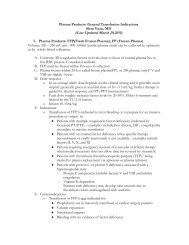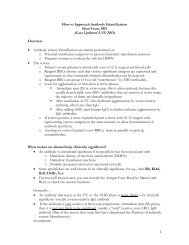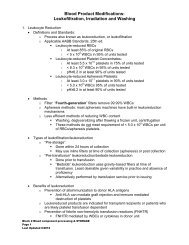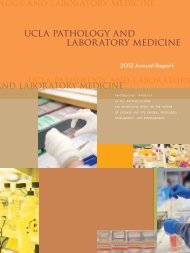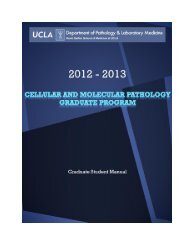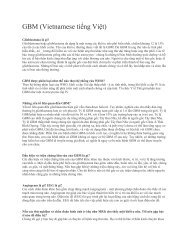BLOOD DONOR TESTING - the UCLA Department of Pathology ...
BLOOD DONOR TESTING - the UCLA Department of Pathology ...
BLOOD DONOR TESTING - the UCLA Department of Pathology ...
You also want an ePaper? Increase the reach of your titles
YUMPU automatically turns print PDFs into web optimized ePapers that Google loves.
o NAT for HBV:• some evidence that this <strong>of</strong>fers additional benefits to serologicaltests.• Not currently required but is being performed by some centers on aresearch basis or to resolve ambiguous serological test results.o NAT for Parvo B 19What Happens When A Donor Unit Tests Positive for an Infectious DiseaseMarker? (Some or All May Apply)1. What to do with <strong>the</strong> product: Quarantine components from donation in inventory Recall/withdraw components shipped to o<strong>the</strong>r facilities Notify transfusion recipients Perform lookback (for HIV, HCV) on previously donated and transfusedproducts, see section on lookback studies below2. What to do with <strong>the</strong> Donor: Defer donor for variable length <strong>of</strong> timeo No deferall: Anti-HBc until test positive again on a seconddonationo Permanent: HIV, HCV, HBV(o<strong>the</strong>r than anti-HBc) markers, Tcruzi, HTLV markers positive. Donor entered into Donor DeferralRegistryo Syphilis- one year post treatmento WNV-120 days Notify and counsel donor:o HIV counseling: at <strong>UCLA</strong>, notification/counseling is performedface-to-face with <strong>the</strong> donor, with an ID physician specializing inHIV cases is in attendanceo O<strong>the</strong>r disease markers: Usually notify by letter. (See Sample LetterA and B, which are letters intended for donors with likely truepositive or false positive test results for HCV). Some cases mayrequire phone notification. Donor re-entryo Possible in an increasing number <strong>of</strong> situations (e.g. Anti-HBcpositive x 2, but NAT and o<strong>the</strong>r markers negative)o Donor usually required to undergo repeat testing.Lookback Studies1. What Are Look Back Studies?Required by <strong>the</strong> FDA: Blood banks must make efforts to identify and notifyrecipients <strong>of</strong> blood components collected from donors who subsequently havetested positive for a transfusion-transmitted infection.Bloodbankbuddy.org, Block 1 Blood Donation and Donor Eligibility.
Lookback are required when <strong>the</strong>re is a possibility that <strong>the</strong> donor, who is likelyinfected now, was in a “window” period at <strong>the</strong> time <strong>of</strong> previous donations. Theprevious units might still have been infectious despite negative test results at <strong>the</strong>time.Recipient <strong>of</strong> previous units must be contacted via letter or o<strong>the</strong>r means, and givenrecommendation on any indicated follow-up. Physicians <strong>of</strong> <strong>the</strong> recipientfrequently also notified. (See Sample Letter C).Often conducted when:o The donor recently tested positive for a marker, for which he/she hadpreviously tested negative.o A new screening test for a transfusion-transmitted infection was recentlyintroduced, and <strong>the</strong> donor is positiveo Donor revealed new historical information (e.g. IV drug use),which wasnot disclosed on prior donationsBloodbankbuddy.org, Block 1 Blood Donation and Donor Eligibility.
SAMPLE LETTER A: LETTER SENT TO <strong>DONOR</strong> TESTED POSITIVE FOR HCVDATEDear «Title» «LastName»:Thank you for your recent blood donation at <strong>the</strong> <strong>UCLA</strong> Blood and Platelet Center.In order to assure <strong>the</strong> safety <strong>of</strong> <strong>the</strong> blood that we give to our patients, we perform numerous tests onsamples <strong>of</strong> each donor's blood.Most <strong>of</strong> your blood test results are normal. However, you had an abnormal result for antibody to Hepatitis Cvirus. Your test result was positive (normal is negative). Before we go any fur<strong>the</strong>r, I want to emphasize toyou that HEPATITIS C VIRUS IS NOT THE VIRUS THAT CAUSES AIDS. Hepatitis C virus can cause aspectrum <strong>of</strong> illnesses that involves <strong>the</strong> liver; however, in most cases, Hepatitis C virus infection does notproduce serious long-term consequences.As part <strong>of</strong> our routine donor testing, we first did a screening test that yielded a positive result for antibody toHepatitis C virus. We performed a second test that is designed to specifically identify <strong>the</strong> presence <strong>of</strong> Hepatitis Cvirus (HCV NAT; NAT = nucleic acid testing) in your blood and this test was also positive. The combination <strong>of</strong> <strong>the</strong>setest results indicates that you currently carry <strong>the</strong> Hepatitis C virus.Your complete test results on your donated unit are as follows:LIST OF ALL TESTS DONE ON <strong>DONOR</strong> <strong>BLOOD</strong> AT <strong>UCLA</strong>Test Performed Your Result Normal1. Hepatitis B Surface Antigen (HBsAg) «HBSAG» Negative2. Hepatitis B Core Antibody (HbcAb) «HBCORE» Negative3. Hepatitis C Antibody Screen (HCV ELISA) POSITIVE Negative4. Hepatitis C Nucleic Acid Test (HCV NAT) POSITIVE Negative5. Syphilis Test (MHA-TP) «MHA-TP» Negative6. HTLV-I/II Antibody (HTLV Ab) «HTLV» Negative7. HIV-1/2 Antibody (HIV Ab) «HIVAb» Negative8. HIV Nucleic Acid Test (HIV NAT) «HIVNAT» Negative9. West Nile Virus Nucleic Acid Test (WNV NAT) NegativeWhat is Hepatitis C Virus?Hepatitis C virus is a virus that can cause hepatitis, which is an inflammation <strong>of</strong> <strong>the</strong> liver. At <strong>the</strong> time <strong>of</strong> firstinfection with Hepatitis C virus, many people will have no symptomswhatsoever, o<strong>the</strong>rs may have mild flu-like symptoms, and some people may have serious symptoms suchas severe abdominal soreness, vomiting, or a yellow coloration to <strong>the</strong> skin. A small but significantpercentage <strong>of</strong> infected people may remain symptomfree for years but may develop severe liver disease over a long time interval.Am I Contagious?It is not entirely certain how most people are infected by <strong>the</strong> Hepatitis C virus. Some people may have beeninfected through an infectious needle (i.e. people who used IV drugs) or through a blood transfusion (usuallyprior to 1990). Sexual contact with an infected individual may be a cause <strong>of</strong> Hepatitis C virus transmission,although <strong>the</strong> risk <strong>of</strong> infection through this mode appears remote. Hepatitis C infected individuals should notshare razors or toothbrushes, and should practice <strong>the</strong> usual standards <strong>of</strong> cleanliness. Also, <strong>the</strong>y shouldcover any cuts, sores, or abrasions. It does not appear that Hepatitis C virus can be transmitted throughcasual contact, and at this time, it is not known whe<strong>the</strong>r a baby can be infected by <strong>the</strong> mo<strong>the</strong>r duringpregnancy or through breast milk.What Should I Do Now?First, I want to reassure you that <strong>the</strong> risk <strong>of</strong> your having any immediate serious repercussions from aHepatitis C infection is extremely small, and <strong>the</strong> long-term risk for serious complications is not very great.Bloodbankbuddy.org, Block 1 Blood Donation and Donor Eligibility.
Still, I recommend that you see a physician as soon as possible. If you are having any symptoms <strong>of</strong>hepatitis (as noted above), I suggest that you see a physician immediately.Can I Donate Blood Again?Autologous Donors:Some people donate blood for <strong>the</strong>ir own use during an upcoming scheduled surgery (this is calledautologous donation). If you are currently an autologous donor, you can continue to donate and yourblood will be used for you during your surgery. All people with positive Hepatitis C tests are still eligibleto be autologous donors at <strong>UCLA</strong> in <strong>the</strong> future.Non-Autologous Donors:Hepatitis C virus is very easily spread through blood transfusion. Because <strong>of</strong> <strong>the</strong> significant risk thatyour blood carries hepatitis C virus, we were not able to transfuse your donated unit into ano<strong>the</strong>rperson. You must not donate again for transfusion to o<strong>the</strong>rs. We maintain a confidential file <strong>of</strong> <strong>the</strong>names <strong>of</strong> donors who are no longer allowed to donate because <strong>the</strong>ir blood may be capable <strong>of</strong>transmitting infection.We have added your name to this file. Information from this file is maintained confidentially and will notbe released without your permission, except if required by law. You may examine your record at anytime to make sure it is accurate.If you prescheduled an appointment to return to donate, our donor center staff will automatically cancelthat appointment.Again, I want to thank you for your efforts in giving your blood, and express my regrets that you can nolonger donate (except as an autologous donor). Should you or your physician need any fur<strong>the</strong>r information,please feel free to call me.Sincerely,Medical Director <strong>of</strong> Transfusion MedicineBloodbankbuddy.org, Block 1 Blood Donation and Donor Eligibility.
he/she might consider having you retested. Of course, if you are having any <strong>of</strong> <strong>the</strong> symptoms <strong>of</strong> hepatitis,we suggest that you see a physician immediately.∙Can I Donate Blood Again?Autologous DonorsSome people donate blood for <strong>the</strong>ir own use during an upcoming scheduled surgery (this is calledautologous donation). If you are currently an autologous donor, you can continue to donateand your blood will be used for you during your surgery. All people with positive screeningtests for antibody to Hepatitis C are still eligible to be autologous donors at <strong>UCLA</strong> in <strong>the</strong> future.Non-Autologous DonorsBecause <strong>of</strong> your abnormal Hepatitis C virus screening results, we have been required by <strong>the</strong> U.S.Food and Drug Administration to destroy your donated unit. Fur<strong>the</strong>rmore, we are currently unableto reinstate you as a blood donor.We maintain a confidential file <strong>of</strong> <strong>the</strong> names <strong>of</strong> donors who are currently not allowed to donatebecause <strong>of</strong> abnormal test results. We have added your name to this file. Information from this fileis maintained confidentially and will not be released without your permission, except if required bylaw. You may examine your record at any time to make sure it is accurate.If you prescheduled an appointment to return to donate, our donor center staff will automaticallycancel that appointment.Again, we want to thank you for your efforts in giving blood, and express our regrets that youcannot donate anymore (except as an autologous donor). Should you or your physician need anyfur<strong>the</strong>r information, please feel free to call us.Sincerely,Medical Director <strong>of</strong> Transfusion MedicineBloodbankbuddy.org, Block 1 Blood Donation and Donor Eligibility.
APPENDIX 3-CSAMPLE LETTER SENT TO TRANSFUSION RECIPIENTS DURING A LOOK BACKDear MR. JOHN DOE :We are writing to you to inform you that a unit <strong>of</strong> red cells that you received at <strong>the</strong> <strong>UCLA</strong> Medical Center on1/1/2005 is <strong>the</strong> subject <strong>of</strong> a lookback investigation. This means that <strong>the</strong> donor <strong>of</strong> <strong>the</strong> unit has subsequentlydeveloped hepatitis C infection, and <strong>the</strong>refore <strong>the</strong> unit <strong>of</strong> blood that you received may have carried a risk forhepatitis C.At <strong>the</strong> time this unit was transfused to you, <strong>the</strong> donor health history on file and all hepatitis test results wereacceptable (negative). These tests included Hepatitis B Surface Antigen (HBsAg), Hepatitis B CoreAntibody (HbcAb), and Hepatitis C antibody Screen (HCV ELISA). All o<strong>the</strong>r donor tests for infectiousdisease, including those for <strong>the</strong> HIV virus were also negative.In May, 2006, however, we were contacted by <strong>the</strong> donor and told that hepatitis C virus was detected in <strong>the</strong>donor’s blood in testing done by <strong>the</strong> donor’s physician. Despite this information, it is important to note that<strong>the</strong> test for hepatitis C performed on red cell unit you received was negative.Although <strong>the</strong> risk that this donor was infectious at <strong>the</strong> time <strong>of</strong> <strong>the</strong> prior donation is small, we cannot exclude<strong>the</strong> possibility that <strong>the</strong> donor was at a very early stage <strong>of</strong> infection before it could be detected by <strong>the</strong>screening test. We recommend that you get tested for hepatitis C for this reason.Hepatitis C virus is a virus that can cause hepatitis, which is an inflammation <strong>of</strong> <strong>the</strong> liver. At <strong>the</strong> time <strong>of</strong> firstinfection with hepatitis C virus, many people will have no symptoms whatsoever, o<strong>the</strong>rs may have mild flulikesymptoms, and some people may have serious symptoms such as severe abdominal soreness,vomiting, or a yellow coloration to <strong>the</strong> skin. Most persons who get hepatitis C carry <strong>the</strong> virus for <strong>the</strong> rest <strong>of</strong><strong>the</strong>ir lives, and while <strong>the</strong>y have some liver damage, many do not yet feel sick from <strong>the</strong> disease. Of every 100persons infected with hepatitis C, about 15 persons will develop cirrhosis (scarring) <strong>of</strong> <strong>the</strong> liver which canlead to liver failure. This can take many years to develop.It is important that you get tested for hepatitis C so you can be checked for liver disease and get treatment, ifindicated. If you have hepatitis C, it is important that you learn what actions you can take in order to protectyourself by avoiding substances that can cause fur<strong>the</strong>r harm to your liver (such as alcohol and certainmedicines), and to avoid spreading this disease to o<strong>the</strong>rs.You can get tested for hepatitis C at no charge by providing <strong>the</strong> <strong>UCLA</strong> case number at <strong>the</strong> top <strong>of</strong> this letter.To arrange for this testing, contact Irene Stalcup at(310) 267-2686.Enclosed is general information about hepatitis C and places you can contact to get more information. We will alsobe sending a letter to your physician, informing him <strong>of</strong> this investigation and that we have sent you a notificationletter.Should you or your physician need any fur<strong>the</strong>r information, please feel free to call us.Sincerely,Medical DirectorTransfusion MedicineBloodbankbuddy.org, Block 1 Blood Donation and Donor Eligibility.



